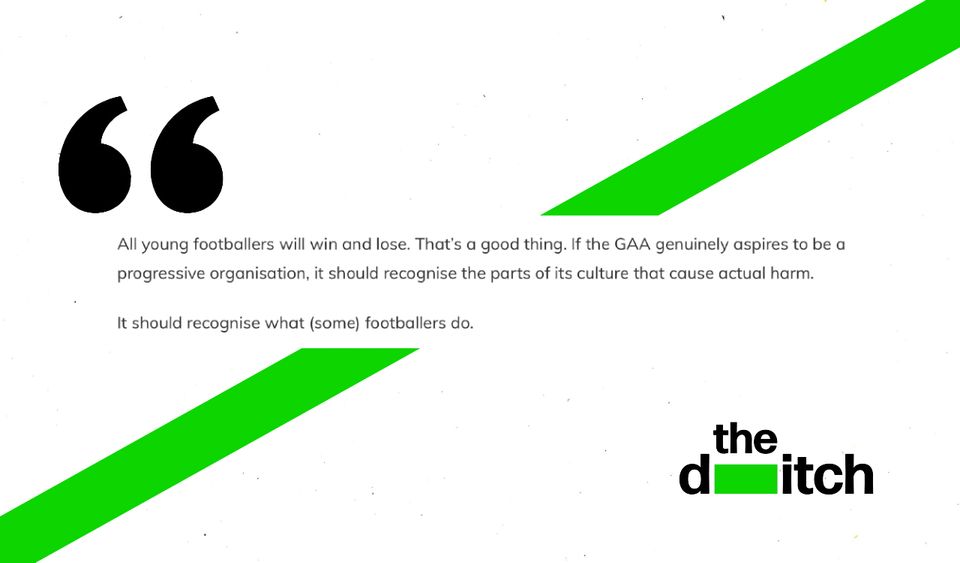Three memories from my time playing Gaelic football as a child: the first as a ten year old, playing at midfield and winning 14-15 to 2-5 against Glencolmcille’s Naomh Columba, a score so ridiculous I still remember it more than two decades later; the second at about 15 years old, again playing at midfield but this time for my school, down by almost 20 points with 10 or 15 minutes to go, my marker pulling me back and me swinging around to punch him in the face, he spitting on my jersey, all a few yards from the referee who gave us both red cards; the third and I’m 13 in my room at a weekend’s training camp for the county.
Walk into a provincial bar on a Friday or Saturday evening and you’ll likely be in the company of at least one ageing man with too many pints in him who can credibly claim, though he won’t have kicked a point for some time, to have played county. It doesn’t make us special.
I just about played for Donegal as a teenager, with little acclaim, unlike my sister who has a wardrobe full of jerseys and a list of honours to her name. I was 13 when the first county panel I played for was brought away for a weekend training camp in an adventure centre. It was the usual: kayaking, wall-climbing, orienteering, team-building exercises. At the end of it we were to play our opening game of the season.
After the first day I was in my room with the lads I was staying with when one of our coaches came in for a chat. He was a grown man who coached my roommates’ club team. He’d been in bother with the county board for boxing a young lad playing for an opposing under-16 team a few years before but no one talked about it anymore. We all knew but we didn’t talk about it.
He started with the standards, how United had got on that day, whether we were feeling the pace of training, asking if we were looking forward to the match against Louth. There was a lull in the conversation. One of the 13-year-olds from his club told our coach he’d heard he’d “been riding” a woman from their town. “Jesus, half the town’s been at her at this stage,” he said.
Our coach agreed with him but was at pains to point out that he’d “been the first to get at her”. He expanded, at reasonable length, on their courtship and how much he’d enjoyed himself and finished up by telling us, “Don’t forget though, boys, I was the first. Anyway, good luck,” before seeing himself out.
A few years after I’d heard all about how that coach was “the first”, I was with a different panel in a dressing room in Sligo before our last game of the season. The coach stood beside a colleague in the dressing room. We were given a speech, sentimental guff intended to indulge us, about why we’d been picked to play county. We had been chosen, apparently, not just because we could play a bit, but because we came from good families, good footballing families, good Donegal footballing families. I could attribute to myself a precociousness after the fact, lie that I understood that this speech spoke to the same principles that give some footballers and good GAA men the idea they can do whatever they want, whenever they like without fear of consequence. But I didn’t get that. I just thought it was silly. (I’m not from a footballing or Donegal family).
But that’s what it was. And the lesson it imparts is more harmful than those given to young boys and girls who have to walk off a pitch having had 20 points put on them. You do enough winning and losing and you learn, to paraphrase Public Enemy’s Chuck D, to not let the wins get to your head or the losses to your heart.
The other stuff can be harder to forget.
Maybe it's what footballers do
The GAA seems proud of its policy of keeping matches up to under-12 non-competitive. I’m guessing that because the organisation seems to have a lot to say about it. Former president Liam O’Neill has said, “I was proud to be part of this. I think it was one of the best decisions we ever made.” Last February current president Larry McCarthy invoked children at the GAA congress. “The over emphasis on winning at such a young age is totally anathema to the philosophy of Go Games, is damaging to children, and deters people from involvement in the association,” he said. The GAA’s director of communications Alan Milton last week spoke of the organisation’s duty to its young members. “In some of the research work that we do, we sometimes get reminders that we have to stay on top of this, are duty bound to revisit it, that all children of that age deserve the same amount of playing time, in a non-competitive environment.”
Much to say about winning and losing, the subject of two of my footballing memories, and how it harms children. Little to say last month about Nicola Gallagher and the abuse she survived from a 'good' GAA man.
In a Facebook post she said, describing 24 years of domestic violence she endured while married to ex-Derry manager Rory Gallagher, “Maybe it's what footballers do.” Not every male footballer grows up to be like Rory Gallagher, but there’s a culture that both permits and excuses this kind of behaviour in the GAA, particularly if your team, as was the case with Gallagher, is winning. It’s a culture that, at the very least, doesn’t like talking about what actually matters.
We’re supposed to believe that no one knew about the kind of man Rory Gallagher is. After the allegations against him became truly public, the Derry county board refused to do two things: they wouldn’t comment on when they became aware of the accusations nor would they clarify what Gallagher meant when he initially said he was “stepping back” (rather than stepping down) from his duties with the team. Let’s wait and see, the board seems to have thought.
Nicola Gallagher said the GAA knew well, telling the Sunday Independent, "The GAA knew about all of this, 100 percent, and the county boards of Fermanagh and Derry knew – because we told them. There were senior members of the GAA who knew what was going on – there are incidents that took place at GAA events. It was a well known fact."
You can believe her. Or you can believe the Derry county board’s statement, one it was forced into, where it said, “Derry GAA was unaware of these allegations until they emerged last week.” When Rory Gallagher finally stepped down, rather than back, the board was reticent. “Derry GAA will be making no further comment at this time,” it said. The Ulster Council similarly didn’t want to talk. "While we cannot comment or make judgement on any specific allegation or allegations, Ulster GAA does not condone any form of domestic violence,” said secretary Brian McAvoy, doing the minimum before the provincial final last month.
The beauty of sport, as well as one of its shortcomings, is that it reproduces the world around us – games, plays and the players who make them present to us images of the human experience and the environment in which it takes place. You’re not going to change the world through sport (despite what people in the Nike and Adidas marketing departments might say), but rather show it for what it is, all its imperfections, the wins and the losses, included.
All young footballers will win and lose. That’s a good thing. If the GAA genuinely aspires to be a progressive organisation, it should recognise the parts of its culture that cause actual harm.
It should recognise what (some) footballers do.


